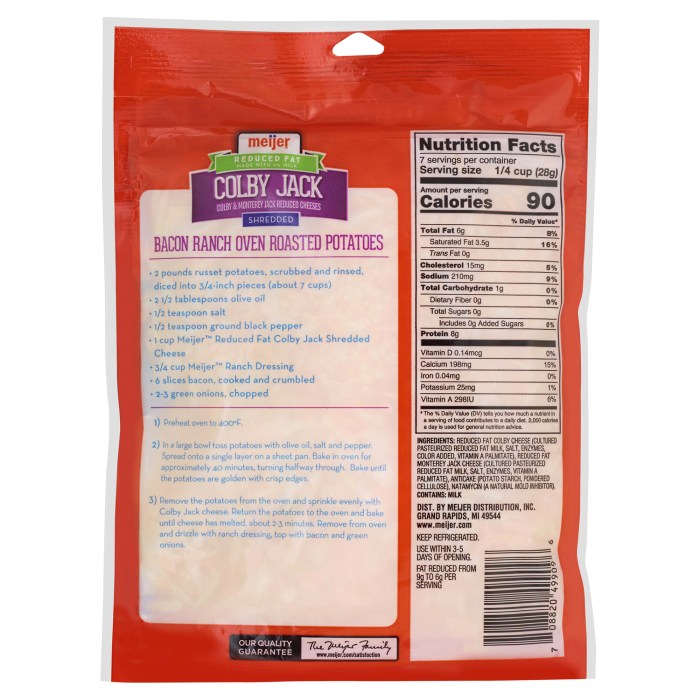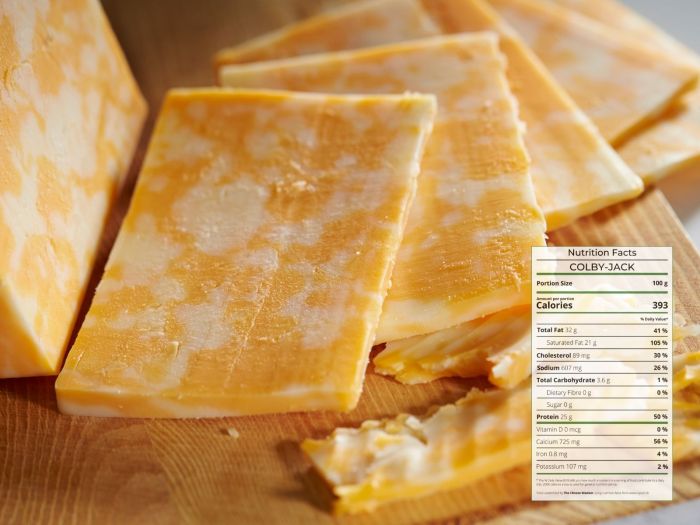Colby Jack Cheese and Dietary Considerations: Colby Jack Cheese Nutrition Label

Colby jack cheese nutrition label – Colby Jack cheese, a delightful blend of Colby and Monterey Jack cheeses, offers a creamy texture and mild flavor that makes it a popular addition to many dishes. However, its nutritional profile necessitates careful consideration within various dietary contexts. Understanding its impact on different diets and its potential effect on cholesterol is crucial for making informed dietary choices.Colby Jack cheese’s nutritional composition presents both opportunities and challenges depending on individual dietary needs.
Let’s examine how it fits into various dietary plans.
Nutritional Profile Across Diets, Colby jack cheese nutrition label
Colby Jack cheese, like most cheeses, is relatively high in saturated fat and sodium. This makes it less suitable for individuals strictly adhering to low-fat or low-sodium diets. For those on a low-fat diet, portion control is key. A small serving might be acceptable, but it should be carefully balanced with other low-fat foods to meet overall dietary goals.
Conversely, a ketogenic diet, which emphasizes high fat and low carbohydrate intake, can readily accommodate Colby Jack cheese, as it is naturally low in carbohydrates. Vegetarians and vegans, however, will need to exclude Colby Jack cheese from their diet as it is a dairy product.
So, you’re checking the Colby Jack cheese nutrition label, eh? Trying to figure out if it’s gonna add to your bebek goreng belly? Well, for a comparison, you might wanna check out the nutrition in mozzarella cheese – it’s like a cheese cousin, you know? Then get back to that Colby Jack label and see which one’s less likely to make you need a bigger pair of celana!
Impact on Cholesterol Levels
Colby Jack cheese, being high in saturated fat, may contribute to elevated cholesterol levels in some individuals. Saturated fats can raise LDL (“bad”) cholesterol, increasing the risk of heart disease. However, the impact varies depending on individual metabolism and overall dietary habits. A diet rich in saturated fats from sources like Colby Jack cheese, without sufficient counterbalancing measures like increased consumption of soluble fiber and omega-3 fatty acids, is more likely to negatively affect cholesterol.
Conversely, incorporating Colby Jack cheese in moderation as part of a balanced diet rich in fruits, vegetables, and whole grains might not significantly impact cholesterol levels for many people. Individual responses to saturated fat vary, making it essential to monitor cholesterol levels and adjust dietary intake accordingly.
Dietary Guidelines for Colby Jack Cheese
Incorporating Colby Jack cheese into a balanced diet requires mindful consumption. Here are some guidelines:
- Portion Control: Limit your intake to small servings (e.g., 1-2 ounces) to manage saturated fat and sodium intake.
- Balanced Diet: Combine Colby Jack cheese with nutrient-rich foods like fruits, vegetables, and whole grains to create a well-rounded meal.
- Frequency: Consume Colby Jack cheese occasionally rather than daily to minimize the impact of saturated fat and sodium on your health.
- Read Labels: Pay attention to the nutritional information on the label to monitor your intake of saturated fat, sodium, and cholesterol.
- Consider Alternatives: For individuals with specific dietary restrictions or concerns, explore lower-fat cheese options or cheese alternatives.
Visual Representation of Nutritional Data

Understanding the nutritional composition of Colby Jack cheese is crucial for making informed dietary choices. Visual aids significantly enhance this understanding by providing a quick and easily digestible overview of the macronutrient and micronutrient profile. Effective visualizations transform complex data into readily interpretable formats, empowering consumers to make better choices aligned with their health goals.
A clear visual representation can significantly improve comprehension of the nutritional content. For example, imagine a pie chart illustrating the macronutrient breakdown in a typical serving of Colby Jack cheese. This allows for an immediate grasp of the relative proportions of fat, protein, and carbohydrates.
Macronutrient Proportion in a Serving of Colby Jack Cheese
Let’s envision a pie chart. Assume a one-ounce serving of Colby Jack cheese contains approximately 8 grams of fat, 7 grams of protein, and 1 gram of carbohydrate. The pie chart would visually represent these proportions. The largest segment, roughly 50%, would represent fat, a slightly smaller segment of approximately 44% would represent protein, and a very small sliver, approximately 6%, would represent carbohydrates.
This visual instantly communicates the dominance of fat and protein in the cheese’s composition.
Vitamin and Mineral Content of Colby Jack Cheese
A bar graph effectively displays the vitamin and mineral content. Each bar represents a specific nutrient, with its height corresponding to the quantity present in a standard serving (e.g., one ounce). The graph should use clear labels and a consistent scale for easy interpretation. Using a standard serving size allows for easy comparison across different cheeses or food items.
For example, a bar graph might show that a one-ounce serving of Colby Jack cheese contains approximately 15% of the recommended daily intake (RDI) of calcium, 10% of the RDI of vitamin A, and smaller percentages of other vitamins and minerals such as riboflavin, vitamin B12, and zinc. The bars representing calcium and vitamin A would be significantly taller than those representing the other nutrients, clearly highlighting their higher concentration in the cheese.
Numerical values for each nutrient should be clearly displayed above or beside each bar for precise quantification.
FAQ Section
Is Colby Jack cheese suitable for a low-sodium diet?
Colby Jack cheese can be part of a low-sodium diet, but portion control is crucial, as sodium content varies between brands. Check the nutrition label for sodium content per serving and choose lower-sodium options when available.
How does Colby Jack cheese compare to other cheeses in terms of calcium content?
Colby Jack cheese is a good source of calcium, comparable to many other cheeses. However, the exact amount varies depending on the brand and the type of milk used in its production. Checking the nutrition label provides the most accurate comparison for a specific product.
Can I eat Colby Jack cheese if I’m lactose intolerant?
Individuals with lactose intolerance may experience varying reactions to Colby Jack cheese. The lactose content is relatively low compared to some other cheeses, but some individuals may still experience digestive discomfort. Consider trying small portions and observing your body’s response.
Is Colby Jack cheese a good source of protein?
Yes, Colby Jack cheese is a good source of protein, contributing to daily protein needs. The exact amount varies by serving size, but it offers a significant amount compared to many other foods.
